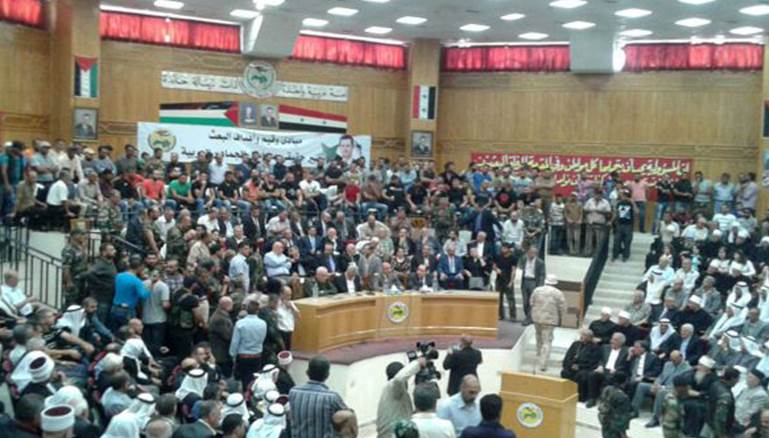At a time when the people of the southern Suweida province are facing growing crime rates, the security forces last week gave general amnesty to criminals under the framework of “national reconciliations” when it legalized the status of more people wanted on criminal charges.
Earlier, for the first time in Syria, the Baath Party branch opened its doors to a flood of convicted criminals who were fleeing from justice to legalize their status. They headed to the branch amid a media display led by the cameras of official Syrian media, in addition to an armed display carried out by loyalist militia fighters who fired into the skies of the terrified Suweida throughout the day.
At the time when the pressing question was about the identity of those benefiting from the reconciliation, this issue became clarified, on Saturday, when reports indicated that a reconciliation had been completed whereby 930 people had their status settled, most of them smugglers and arms dealers. But they were not the first-level criminals or gang leaders that have become notorious in Suweida.
Local activist Amman Suleiman told al-Modon that the reconciliation began on Wednesday with around 630 people settling their status, and was completed on Thursday with the legalization of 300 others, 90 percent of whom were criminals and fugitives. The rest were limited to some state employees and those who had evaded compulsory or reserve service who had been induced to enter the “Baath brigades” and work in their ranks in Suweida as an alternative to military service.
The most dangerous aspect of the reconciliation lies in that it stipulates overthrowing most judicial decisions issued against people with an irregular status, including personal lawsuits. In this the people saw a contempt for justice and for the right of people to rely on the court to hold criminals to account.
Abou Amjad, a Suweida resident, said the party’s leaders had exploited the occasion of the reconciliation to strengthen the ranks of the Baath brigades, by attracting these people and inducting them into their ranks. He predicted that the Baath brigades militia would soon become the biggest militia in terms of the number of its members.
In addition to that, Abou Amjad told al-Modon that the secretary of the Baath Party branch in Suweida, Yasser al-Shawfi, had exploited the Baath’s mediation and organization of this reconciliation to present the party as a sponsor able to mediate and facilitate reconciliation between the state and the people. In addition to that, Shawfi exploited the occasion to market himself as the highest political authority in Suweida, because he is the new secretary for the Baath Party branch, succeeding the chairman of the security committee and the previous secretary of the branch, Shalabi Janoud, who disappeared in mysterious circumstances about a year ago.
The first repercussions of the reconciliation could be realized immediately as some criminal groups stole some cars in broad daylight and escaped many of the security barriers deployed in the province. Meanwhile the number of armed clashes between gangs has risen, and the ascent of new gangs who had earlier disappeared, like the gangs who steal firewood from peasant orchards and forests. Saturday saw clashes in the village of Bousan in the eastern Suweida countryside, between a gang stealing firewood and some farmers, killing two young men.
This article was translated and edited by The Syrian Observer. Responsibility for the information and views set out in this article lies entirely with the author.


